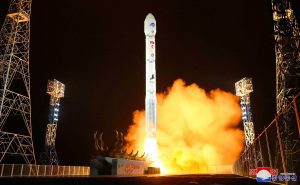North Korea claims another test of underwater nuclear drone

Seoul, The Gulf Observer: North Korea on Saturday claimed it tested this week a second known type of nuclear-capable underwater attack drone designed to destroy naval vessels and ports, adding to a flurry of weapons demonstrations this year that have heightened tensions with rivals.
The report of the four-day test came a day after the nuclear envoys of the United States, South Korea and Japan met in Seoul to discuss the growing North Korean nuclear threat and called for stronger international efforts to crack down on illicit North Korean activities funding its weapons program.
The North’s official Korean Central News Agency said the drone, named “Haeil-2” after a Korean word meaning tsunamis or tidal waves, traveled underwater for more than 71 hours before successfully detonating a mock warhead in waters near the eastern port city of Tanchon on Friday. KCNA said the test proved that the weapon could strike targets 1,000 kilometers (621 miles) away with “fatal attack ability.”
North Korean state media last month reported two tests of another drone, named “Haeil-1,” and described the weapon as capable of setting off a “radioactive tsunami” to destroy enemy vessels and ports.
Analysts, however, are skeptical whether such a device would add a meaningful new threat to North Korea’s growing nuclear arsenal built around missiles and whether it’s reasonable for the North to pursue such capabilities considering its still-limited supplies of nuclear bomb fuel. South Korea’s military has said it believes North Korean claims about Haeil-1 were likely “exaggerated or fabricated.”
On Friday, U.S. President Joe Biden’s special representative for North Korea, Sung Kim, met with his South Korean and Japanese counterparts in Seoul where they issued a joint statement calling for stronger international support to stem North Korean efforts to evade U.N. Security Council sanctions imposed over its nuclear weapons ambitions.
The envoys expressed particular concern about North Korea’s cybercrimes and illicit labor exports, which Seoul says could possibly expand as it further reopens its borders as COVID-19 fears ease.
North Korea in 2023 alone fired around 30 missiles in 11 different launch events, including an intercontinental ballistic missile that demonstrated potential range to reach the U.S. mainland and several shorter-range weapons designed to deliver nuclear strikes on South Korean targets.


